There are plenty of jobs you can get without a 4-year college degree. Medical assistants, dental hygienists, and paralegals all earn good incomes without spending years in school. However, if you are looking for a career that will actually pay you while you train, you might consider a career as an electrician.
How to Become a Licensed Electrician
Becoming a licensed electrician isn’t easy, and it doesn’t happen overnight. In fact, it takes at least four years to become a licensed industrial electrician. Fortunately, apprenticeship paths include more than just 144 hours in the classroom and 2,000 hours of on-the-job training (OJT)—it includes a steady paycheck.
There are three primary organizations in the United States that offer apprenticeships:
- The International Brotherhood of Electrical Workers (IBEW)
- The Independent Electrical Contractors (IEC)
- The Associated Builders and Contractors (ABC)
All three offer programs that meet federal and state requirements for formal apprenticeships. After completing an apprenticeship program, candidates take a state licensing test.
While all three programs have their pros and cons, we’re going to focus on the IBEW Electrician Apprenticeship Program.
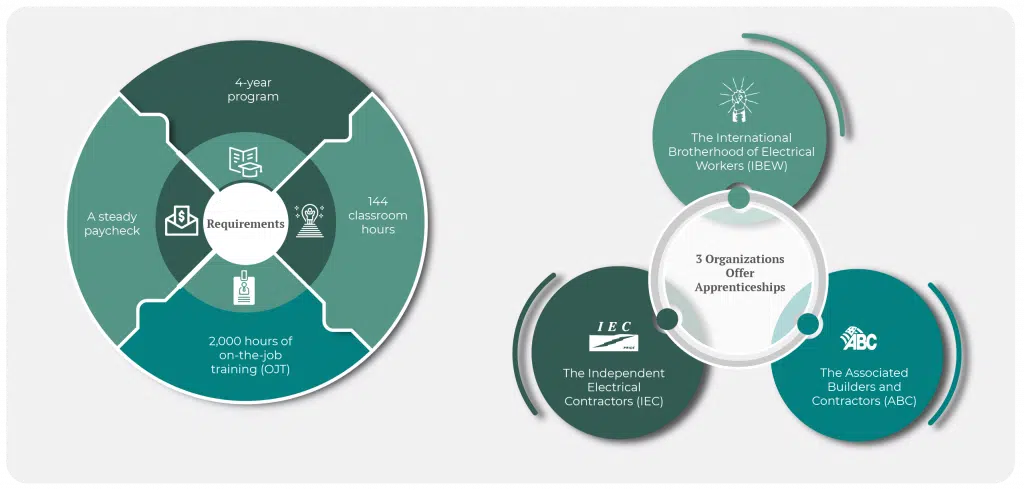
Untangling Some Alphabet Soup
Before we get too far ahead of ourselves, let’s detangle some of the acronyms floating around. The IBEW has over 750,000 members and is the largest union of electrical workers in the United States. Its members work on construction sites, keep utilities running, are vital to telecommunications, and are behind the scenes for broadcasting, manufacturing, railroad, and government projects.
The union is made up of local organizations, called IBEW Locals. Locals provide support, benefits, and information to its members, and provide a gateway between the national organization and the local branches.
The IBEW electrical apprenticeship is a joint program between the IBEW and the National Electrical Contractors Association (NECA). Once called the National Joint Apprenticeship and Training Committee (NJATC), the apprenticeship is now called the Electrical Training Alliance. Each IBEW-NECA partnership also includes the formation of a Joint Apprenticeship and Training Committee (JATC), which is made up of representatives from both groups and oversees the training that takes place in the Electrical Training Alliance.
To summarize that for you:
- IBEW – International Brotherhood of Electrical Workers. The largest electrical industry labor union, representing about 775,000 electrical workers and retirees.
- IBEW Local – The local IBEW branch, this always includes a number, such as IBEW Local 47. It coordinates the IBEW electrical activities in a certain geographical area.
- NECA – National Electrical Contractors Association. This US trade association represents the $130 billion/year electrical contracting industry and works to advance the electrical contracting industry.
- NJATC – National Joint Apprenticeship and Training Committee. Used to be nationally responsible for the electrical industry training.
- Electrical Training Alliance – partnership between IBEW and NECA that oversees apprenticeship training. Replaced the NJATC as the designated institute for this purpose.
- JATC – Joint Apprenticeship and Training Committee. Also a joint effort of the local IBEW and NECA. Oversees the electrical training and hiring process. Receives guidance from the Electrical Training Alliance but has its local independent set of regulations.
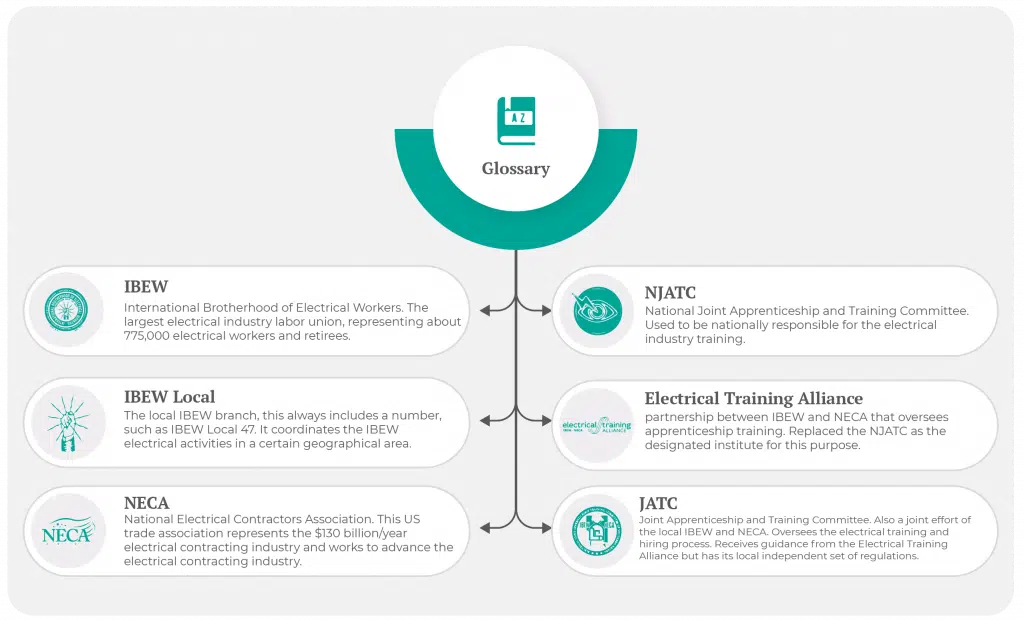
How to Join an IBEW Electrician Apprenticeship Program
The apprenticeship program is designed to allow students to work and earn a paycheck while learning at the same time. Participants gain valuable OJT training and meet the education requirements needed to get their license.
The IBEW Apprenticeship Application and Acceptance Process
As you might expect, apprenticeships are highly sought after, and the competition to get available slots is fierce. There is a process you’ll go through, which typically goes like this:
- Meet minimum requirements
- Submit application
- Take the aptitude test
- Participate in an interview
- Wait on eligible list
- Start apprenticeship
We’ll go through each one of these steps, so you know what to expect at every stage of the apprenticeship application process.
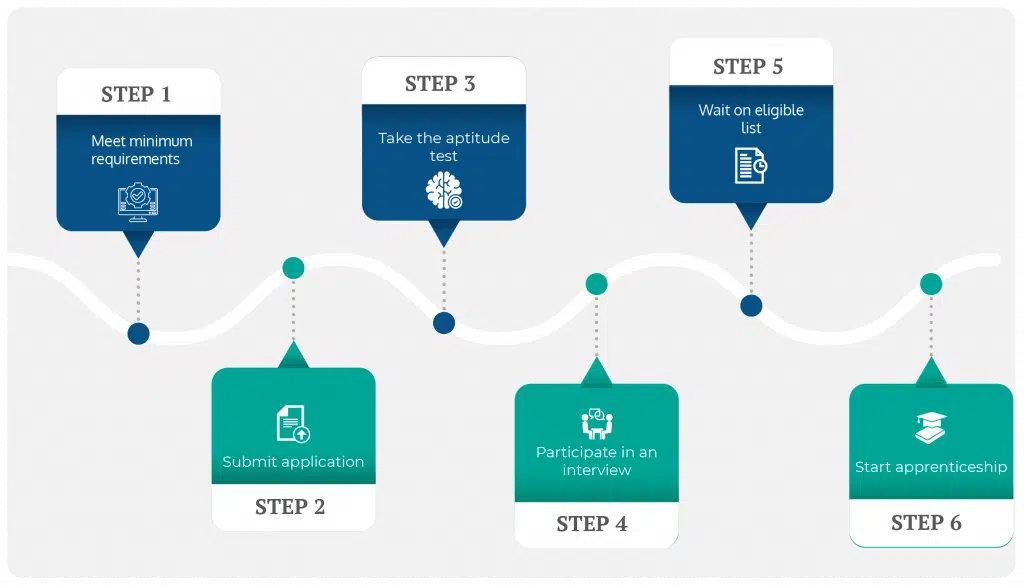
Step-1: Meet Minimum Requirements
Every IBEW apprenticeship applicant must meet the following criteria to be accepted into an IBEW/NECA Electrical Training Alliance apprenticeship:
- Be 18 or older
- Completed high school education, passed a GED, or completed a 2-year Associate Degree or higher
- Completed one year of high school algebra
In addition, some local programs have additional requirements. Be sure to check in your area for anything else you may have to complete before applying for an apprenticeship.
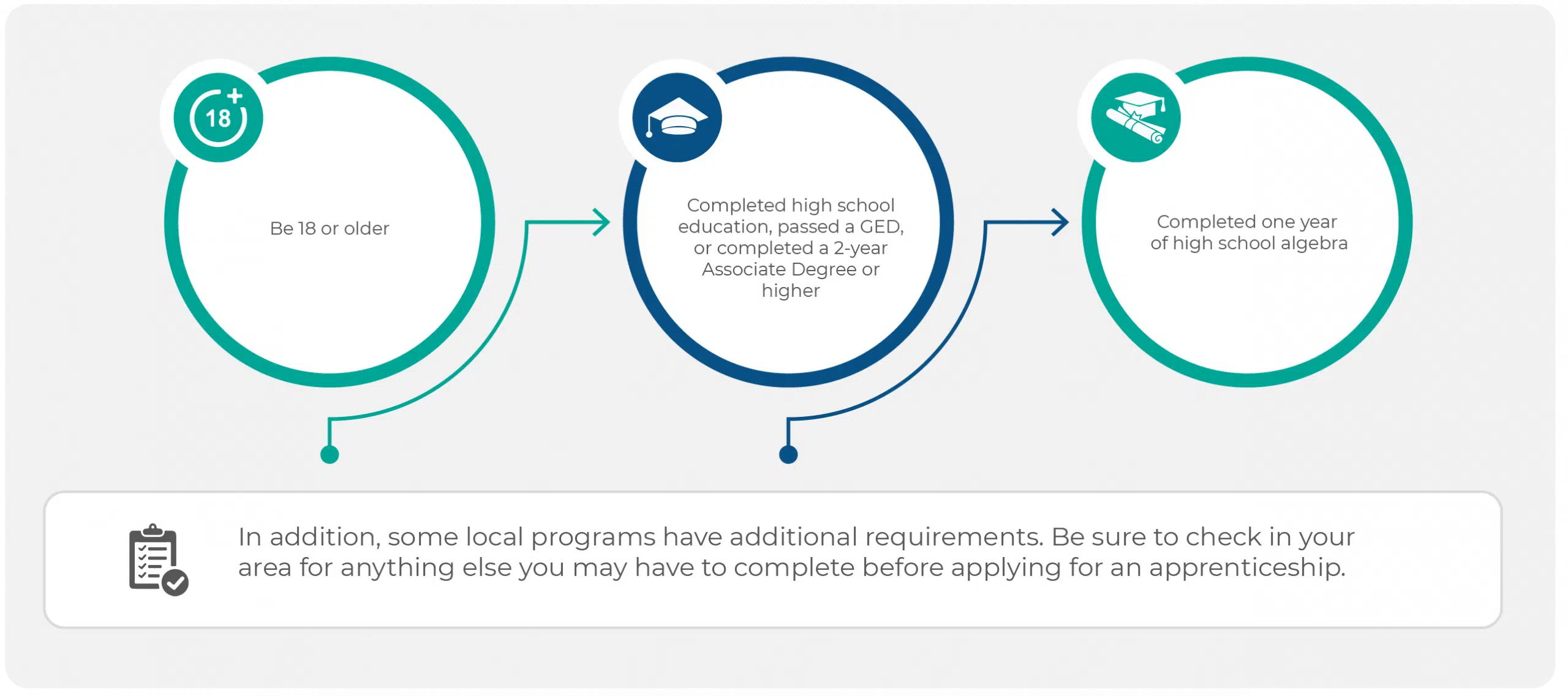
Step-2: Submit Application
Your application is the first formal interaction you’ll have with the apprenticeship program. Most program require you to fill out the application by hand, so it’s vital that you take your time and write legibly and be sure to fill every field in. You’ll also have to locate and send high school and college transcripts. If you have any questions, call the training center office and ask for help.
Step-3: Take the Aptitude Test
Your electrical aptitude test will cover reading comprehension and basic algebra. Doing well on this test is one of the most important steps in the apprenticeship application process. Candidates are ranked highest to lowest based on test scores, and the highest-scoring candidates are invited in for an interview.
Start preparing for your IBEW aptitude test today!
Step-4: Participate in an Interview
The interview is one of the most frustrating elements of the process. Apprenticeships only accept candidates once or twice a year, so you may end up waiting for months without knowing if you’ve been accepted.
The interview usually takes place with a panel of IBEW members, NECA members and program administrators. Be prepared to talk about why you want to be in the program, any experience you have, and work preferences. Be honest and explain what you hope to get out of the apprenticeship program.
Step-5: Wait on Eligible List
After your interview, you’ll be placed on eligibility list, and invited to come in as new apprenticeship positions become available. You’ll remain on the list for two years, at which point you will need to reapply if you haven’t been offered an apprenticeship.
Step-6: Start Apprenticeship
After spending time on the eligible list, you’ll receive a letter with details about starting your apprenticeship. Congratulations, you’ve made it and you’re on your way to a successful IBEW career.
Which IBEW Electrical Apprenticeships are Available?
There are four different types of IBEW apprenticeships:
- Inside wireman
- Outside lineman
- Residential wireman
- Telecommunications installer technician

Apprenticeship Type 1: Inside Wireman
An inside wireman installs conduits, electrical wiring, fixtures, and electrical apparatuses inside commercial buildings and in a multitude of industrial settings. You’ll primarily work on construction sites and in industrial settings.
Inside wireman is the largest of all the electrical specialties, with over 200,000 members in the IBEW. As a five-year program, it is the longest IBEW apprenticeship.
Apprenticeship Type 2: Outside Lineman
Outside linemen spend their days climbing poles and in bucket trucks, fixing or installing electrical power lines outdoors. You’ll primarily perform electrical work for transmissions and distribution of electrical energy.
The apprenticeship program for outside linemen is three and a half years.
Apprenticeship Type 3: Residential Wireman
As you might expect, residential wiremen work in single and multi-family homes, fixing and installing wiring and cable systems. A residential wireman apprenticeship is a three-year program.
Apprenticeship Type 4: Telecommunications Installer Technician
Telecommunications installer technicians install equipment and circuits for telephones, computer networks, security systems, and more. This apprenticeship is a three-year program.
How to Apply for an IBEW Apprenticeship
The three main steps on your IBEW electrician apprenticeship application are
- Researching the IBEW local union in your area
- Reviewing the qualifications and requirements for an IBEW apprenticeship
- Submitting an application for the apprenticeship program
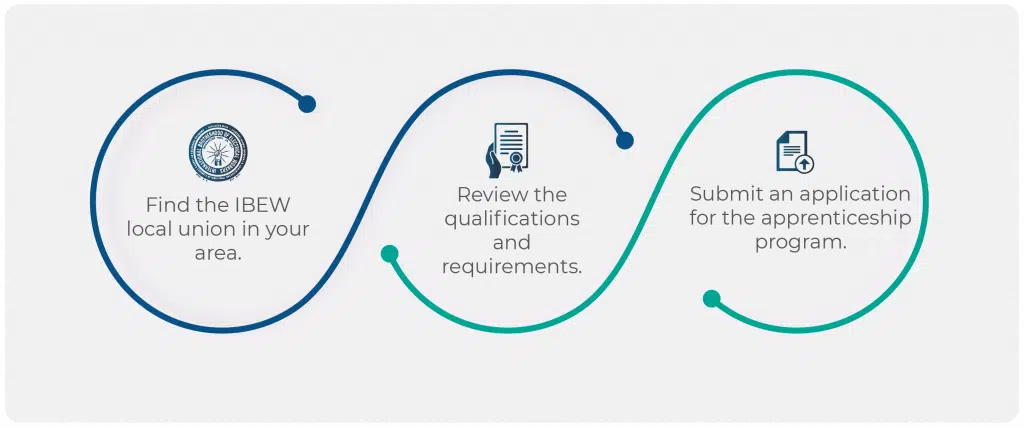
Research the IBEW Local Union in Your Area
Visit the IBEW website to locate the nearest IBEW Local Union in your area and do the following:
- Find out the requirements for entry into the program, which can vary depending on the local union.
- Learn about the benefits of the program, such as on-the-job training, classroom instruction, and the potential for a career as a skilled electrician.
- Understand the expectations of an electrician apprentice, including working long hours, being physically fit, and being able to work in a team environment.
Researching the IBEW Local Union in your area might involve visiting their website, contacting them via phone or email, or attending an informational meeting or job fair to learn about their apprenticeship program.
Review the Qualifications and Requirements
Check the IBEW Local Union website or contact them to review the qualifications and requirements for applying for an electrician apprenticeship:
- Check the eligibility requirements, which may include age, education level, and residency.
- Determine if you meet the basic qualifications for the program, which typically include a high school diploma or equivalent, a valid driver’s license, and the ability to pass a drug test.
- Learn about the skills and traits that are valued in electrician apprentices, such as good math skills, physical stamina, and the ability to work at heights or in confined spaces.
Fully understanding the qualifications and requirements might require you of speaking with an advisor or recruiter to determine if you meet the minimum requirements for the program.
Apply for the Apprenticeship Program
Complete and submit the application form on the IBEW Local Union website or in person at their office:
- Fill out the application form completely and accurately, including your personal information, education, and work experience.
- Provide all required documentation, such as your high school diploma or GED certificate, driver’s license, and any relevant certifications or licenses.
- Submit the application by the deadline and follow up with the IBEW Local Union to ensure that your application was received.
It is recommended to follow up with the IBEW Local Union to ensure that your application was received and is being considered.
IBEW Application Process FAQ
Yes, the application process for IBEW apprenticeship programs may vary between different local unions. While there are some general requirements that are common across all IBEW apprenticeship programs, such as having a high school diploma or equivalent, being at least 17 or 18 years old, and possessing a valid driver’s license, there may be differences in the specific qualifications or application procedures required by each local union.
For example, some local unions may require applicants to complete an aptitude test or physical exam, while others may prioritize work experience or prior training in related fields.
Additionally, the application deadline, the format of the application, and the method of submission may differ between local unions. It is important for prospective applicants to research the specific requirements and application procedures for the local union in their area to ensure that they meet the necessary qualifications and submit their application correctly.
Yes, you can apply to several IBEW locals at the same time. However, it’s important to keep in mind that each IBEW local union has its own application process and deadlines, so it’s important to carefully read and follow the instructions for each application to ensure that all necessary information is provided in a timely manner.
Additionally, suppose you are accepted into multiple IBEW apprenticeship programs. In that case, you will need to choose which program to pursue, as it’s generally only possible to be enrolled in one apprenticeship program simultaneously. It’s important for candidates to carefully evaluate the requirements, benefits, and opportunities offered by each program before making a decision.
Finally, suppose you are accepted and chosen to start an apprenticeship at an IBEW local, you need to tell every other local you applied to that you withdraw the application.
Note that the official NECA-IBEW website discourages applicants from applying for multiple programs and encourages them to apply for the program from which they plan to graduate.
If you have several IBEW locals near you, it can be challenging to choose which local to apply to for an apprenticeship program. Here are some factors that you might consider to help make your decision:
Location: Consider the location of each local union in relation to your home or other commitments. A closer location might be more convenient for commuting, while a further location might offer more opportunities for apprenticeships or job placements.
Training and Curriculum: Check each local union’s training curriculum and facilities to ensure that they offer the type of training that you are interested in and that it aligns with your career goals.
Reputation: Research the reputation of each local union by talking to people who have gone through the program, checking online reviews, and looking at the union’s track record in terms of job placements and apprenticeship completion rates.
Union Culture: Consider the culture and values of each local union to ensure that they align with your own values and personality. You may find that one union is a better fit for you than another.
Application Process: Check each local union’s application process, including the application requirements, deadlines, and fees, to ensure that you are comfortable with the process and can meet all the requirements.
Ultimately, it’s important to do your research, talk to people, and carefully evaluate all the factors before making a decision. Remember, applying for an IBEW apprenticeship is a significant commitment, and it’s important to choose a local union that is the best fit for you and your goals.
In general, high school students are not eligible to apply for an IBEW apprenticeship program until they have graduated from high school or obtained their GED (General Educational Development) certificate. Most IBEW apprenticeship programs require applicants to have a high school diploma or equivalent as a minimum qualification.
However, high school students who are interested in pursuing a career as an electrician should check with their local IBEW union or other training providers to see what opportunities are available to them.
The application fee for an IBEW apprenticeship program may vary depending on the local union and location. Generally, you can expect a non-refundable $25-$50 processing fee for each application, usually to be paid by check or money order at the time of application.
In some cases, financial assistance may be available to help cover the cost of the application fee. Applicants who have questions or concerns about the application fee should contact their local union or the apprenticeship program coordinator for more information.
The educational transcripts that you need to include with your IBEW apprenticeship application may vary depending on the specific local union and program requirements. However, in general, applicants should be prepared to provide transcripts that demonstrate their educational background and achievements.
Typically, this will include high school transcripts that show your grades, GPA, and any relevant coursework. If you have attended college or vocational school, you may also need to provide transcripts from those institutions as well. If you have any questions or concerns about which transcripts to include, you should contact your local union or the apprenticeship program coordinator.
While some IBEW locals may receive printed copies of the transcripts, most require nowadays an electronic copy in a PDF format.
The length of the IBEW apprenticeship application process can vary depending on a variety of factors, including the number of applicants seeking to enter the program, holidays, economic conditions, and the demand for apprentices in the specific local.
Overall, you can expect 2-3 months to navigate the application process, and depending on the IBEW local practices and demand for the specific program, you may be placed on the ranked list for several months before being contacted and starting your apprenticeship.
How to Improve Your Chances of Landing an Electrical Apprenticeship
Apprenticeships are awarded based on your aptitude test score and performance on the interview. Therefore, it’s vital that you put your best foot forward if you’d like to earn your spot.
Pass the Aptitude Test
The algebra portion of the test isn’t particularly difficult, but you’ll only have about a minute a half to answer each question. This can be especially challenging for applicants who haven’t taken high school algebra in a while. Here are some tips so you can excel at the test:
- Take an online math refresher course – you’ll be able to relearn all the math you’ve forgotten since high school.
- Take an IBEW practice course – these courses, like those offered by iPrep, help simulate test conditions and show you which areas of algebra you need to study.
- Start practicing at least two weeks in advance – the earlier you begin practicing the faster you’ll be when it comes to test time, which will save you valuable seconds on every question during test time.
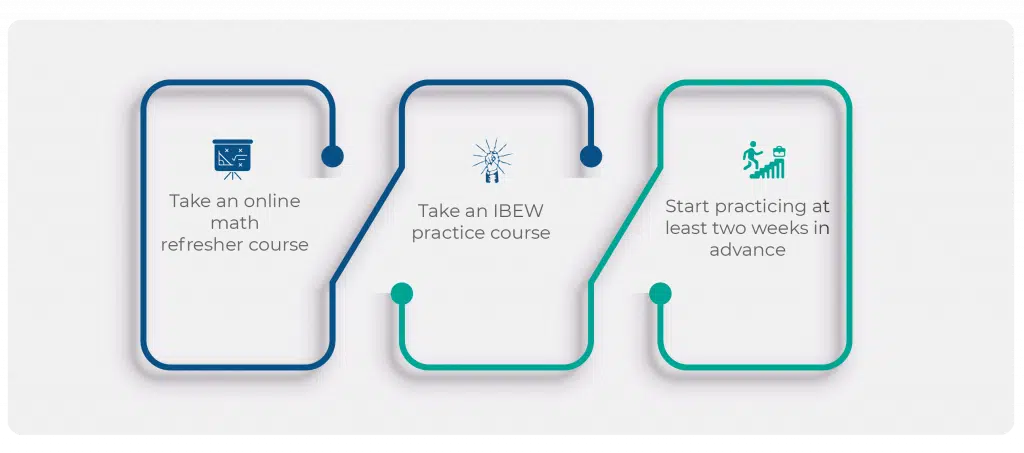
Excel the Interview
The interview portion of the application is the first time you will be face-to-face with your future colleagues, so you want to make a strong impression. Here are some things you can do to ace the interview:
- Dress for success – a suit isn’t necessary, but wear nice slacks and a button-down shirt, clean shoes, and a fresh haircut (and shave).
- Make contact – offer a firm handshake, and look the panel in the eye when responding to their questions.
- Be clear – answer questions directly, without rambling on and going off-topic.
- Practice – ask some friends to conduct a panel interview, so you can get used to answering questions in front of a group of people, or prepare on your own for the interview.
Here are several questions that have been asked during apprenticeship interviews. There are no right answers to these questions; however, successful candidates report that they practiced answering these questions using the STAR format, where they described a Situation, explained the Task they were given, talked about the Action they took, and shared the Results.
- Tell us about a time you didn’t understand the instructions you were given for a task
- Tell us about a time you had to choose between group or individual work
- Tell us about a time you missed a deadline
- What is something you built recently you’re proud of?
- Describe a time you had a certain job to do but didn’t know how.
- Describe a time when someone got hurt. What did you do?
- Are you good at taking instructions?
- When was a time you had to do something you found difficult?
- Give an example of a time you made a mistake, and how did you handle it?
- Why do you want this job?
- Walk us through a time of when you started and finished a project.
- Describe a time when you had a conflict with a coworker and how you resolved it.
- Describe a time when you had a project, but weren’t given complete instructions, or were given unclear instructions.
- Is there anything else you would like to add? (This is a good opportunity to tell the panel why you would be a great member in the union!)
Now you know everything there is to know before starting the process of joining an IBEW Electrician Apprenticeship Program.
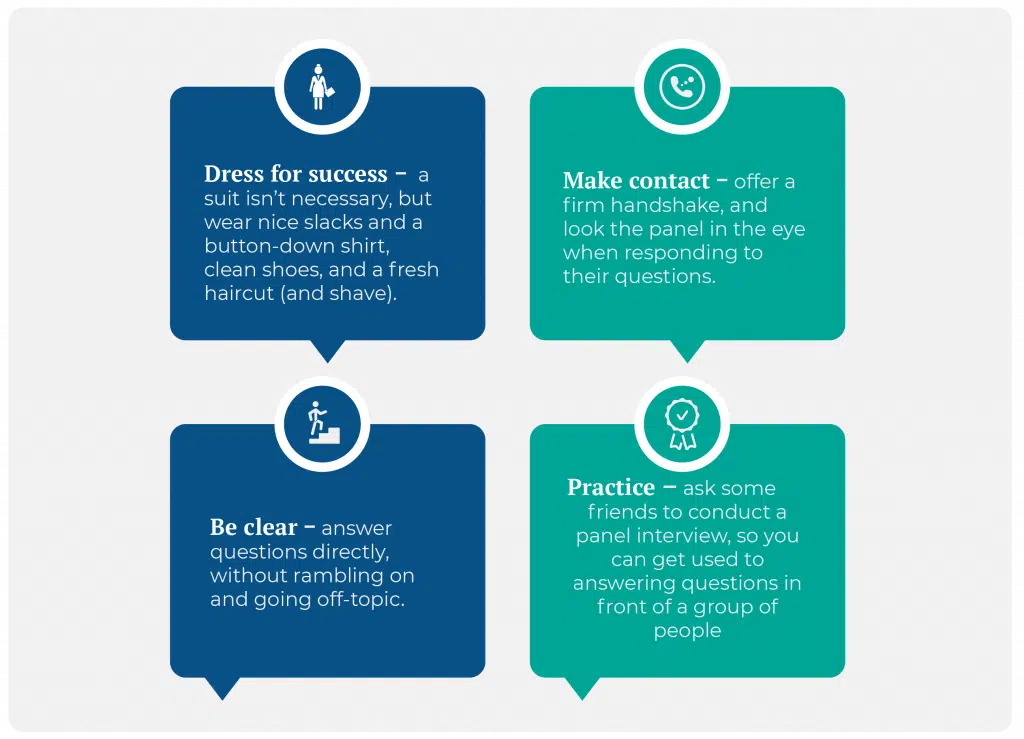
Next Steps
If you meet the minimal requirements, browse the internet, find the nearest IBEW local, and start the application process.
You can also start preparing for the first major obstacle and practice for the IBEW aptitude test.
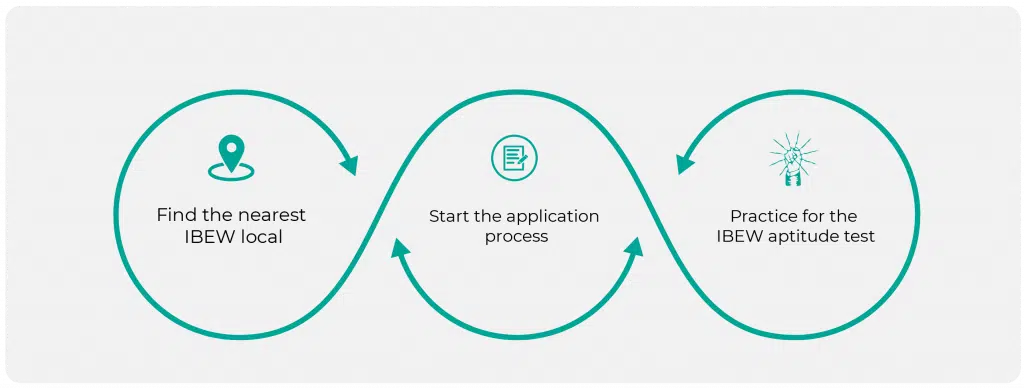
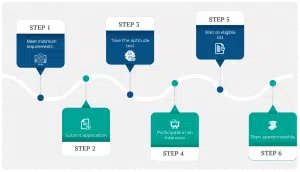






This iprep study guide has allowed me to be fully prepared for when I take the apptitude test so that I can put my best foot forward knowing were I stand in test taking
I am interested in applying. I am currently a student at Lincoln Tech.
Hi Bomani, We are not affiliated with the test providers nor with the employers. We only provide preparation services.
Good luck on your test!
Hi Bomani, we’ve just added a “How to apply” section if this is still of relevance to you.
Did you figure out how to apply? I am interested aswell and dont know how to start
Hi Lucas, we’ve just added a “How to apply” section if this is still of relevance to you.
Hi , Sorry, I have a question. Is there any special program? For an electrician who has ten years of experience. in Afghanistan with American forces.
Hello,
How can I apply?
Do you have any test tips for the math aptitude test
Hi Derrick. You can find here plenty of tips for the math aptitude test: https://www.iprep.online/courses/math-aptitude-test-practice/